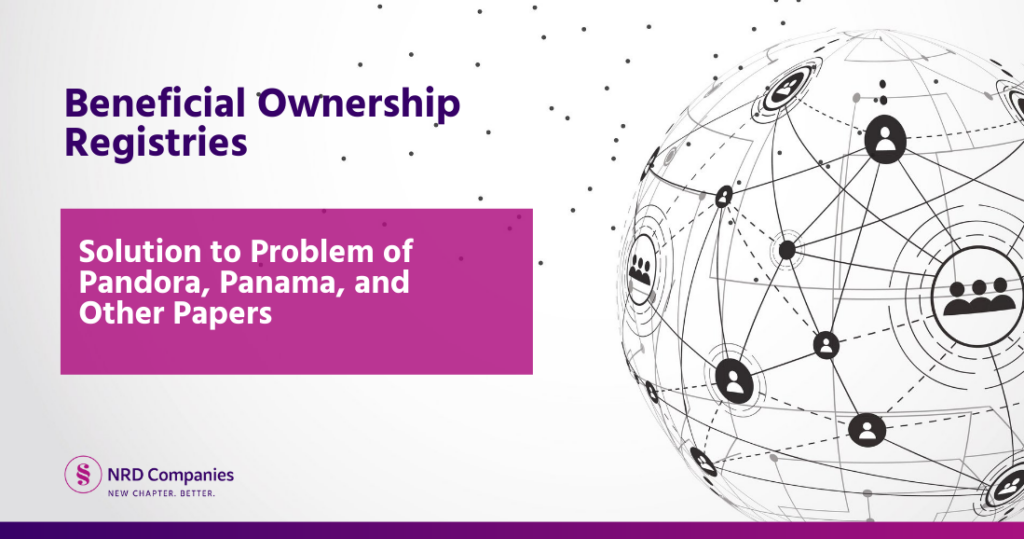Troves of information stored in Pandora papers, made public in October, are massive: almost 12 million documents, taking up nearly three terabytes of data. Pandora papers were obtained from 14 providers of services and no less than 38 jurisdictions. Those documents store information on about 29,000 beneficial owners, with more than 330 politicians from more than 90 countries.
Beneficial owners are natural persons identified as real owners or receivers of benefits of various companies. Often such owners are not readily known – they can be hidden behind chains of shell companies.
Long-known issue
Massive disclosures of private financial information are not new, however, and the lack of corporate transparency is a well-known issue. Before Pandora papers, there were Paradise papers, released in 2017, and Panama papers, released in 2016. All three sets of documents were investigated and partially published by the International Consortium of Investigative Journalists (ICIJ).
A number of smaller-scale investigations related to offshore companies and hidden business interests that have been made public by multiple investigative journalists over past years are immeasurable.
An unending stream of such disclosures is clear proof that publicly accessible beneficial ownership registries are vital for preventing corruption and tax avoidance practices. Without transparent, publicly accessible information about actual owners, there will be many more papers, political scandals, and stains on the reputation of countries, political leaders, and people in businesses.
Interested in this story?
Contact us to discuss any inquiries you might have about this topic.


Thank you!
We will contact you soon!
“There have been multiple international initiatives over many years aimed at addressing this issue. At the G8 summit in Lough Erne in 2013, members agreed to the Action Plan Principles to Prevent the Misuse of Companies and Legal Arrangements; in 2014, the G20 issued their High-level Principle in Beneficial Ownership Transparency at a summit meeting in Brisbane,” says Ieva Tarailiene, Head of Registry Practice at NRD Companies and former director of Registry center of Lithuania.
Another influential organization in this sphere is the Financial Action Task Force (FATF). Its recommendations set out a comprehensive and consistent framework of measures for countries to implement to combat money laundering and terrorist financing, and the financing proliferation of weapons of mass destruction. Transparency International also provides a helpful definition of a beneficial owner.

Global shift
The growing pressure on governments and companies to increase transparency and accountability has resulted in a global shift towards increased disclosure around beneficial ownership. Corporate transparency and the accessibility of beneficial ownership and controller information have become a leading topic on the international business registry agenda.
New regulations on anti-money laundering and the counter financing of terrorism require jurisdictions to increase the level and integrity of information held centrally and made available to obliged entities.
The European Parliament has adopted the Fourth EU Anti-Money Laundering Directive (EU2015-849) (AMLD4), a law that obliges European Union Member States to maintain central registries detailing the beneficial owners of companies. The registries of Beneficial ownership should be accessible to the appropriate authorities such as financial institutions and counter crime agencies and other entities who can demonstrate legitimate reasons for access to this information. In 2018 EU approved the 5th EU AMLD, which contained measures for enhancing the ability of competent authorities to detect and investigate money laundering and financial crime.
The shift towards transparency is not just limited to the EU. One of the drivers for change is the Financial Action Task Force (FATF). This inter-governmental body sets standards and encourages members to combat ‘money laundering, terrorist financing and other related threats to the integrity of the international financial system’. The beneficial ownership registry has already been implemented in a number of jurisdictions outside the EU, and similar legislation is in the process of being drafted in many more jurisdictions.
The FATF clearly states that it is essential to set out the measures countries should have to enhance the transparency and availability of beneficial ownership information of legal persons and arrangements. Governments should ensure that adequate, accurate, and timely information on the beneficial ownership and control of legal persons can be obtained or accessed in a timely fashion by competent authorities.
A solution in form of beneficial ownership registries is gaining traction
It is gratifying that to combat tax evasion and stop illicit financial flows, many governments advocate for public beneficial ownership registries, take legal measures, and use technology to collect, store, and provide information about the actual beneficiaries.
“In the last few years, considerable progress has occurred, and laws requiring beneficial ownership registration have been approved. Those governments that do not yet have operational registers today should rush to establish and develop mandatory public registers that reveal the actual owners of trusts and companies,” states Tarailiene.
Beneficial ownership registries was also one of the hottest topics in the recently held Corporate Registry Forum (CRF) virtual conference, hosted by the Uganda Registration Services Bureau (URSB). Representatives of business registry institutions attending the conference from more than 60 countries have reached a clear understanding that publicly available information on true owners of businesses is an urgently needed, globally accepted solution to the problem of corruption and tax avoidance, vital to the modern political, social and corporate landscape.
“Therefore, once again, it should be emphasized what benefits society receives from the transparency of beneficial ownership. In general, public registries of beneficial ownership allow easier tracing of dirty money and make it more difficult and less attractive for people to benefit from the proceeds of corruption and crime,” concludes Tarailiene.
What are the benefits for citizens?
- Once published, citizens can use beneficial ownership information to work with law enforcers, civil society, and others to take action to hold those who misuse anonymous companies responsible.
- Increased transparency around real owners can increase trust and accountability for citizens and their government.
What are the benefits for companies?
- Hidden ownership poses problems for honest companies because they don’t know who they are doing business with. Publishing the real owners supports a level playing field for all companies and lets them know who they are doing business with.
- Transparency about real owners can reduce reputational and financial risks.
What are the benefits for governments?
- Beneficial ownership transparency prevents conflict of interest and can help ensure compliance with anti-corruption provisions.
- Beneficial ownership transparency helps prevent tax evasion and ensures that governments get the revenue they are owed.
- It supports governments getting the highest value for their extractive contracts and enhances revenue collection.
Obviously, without a public and easily accessible registry, these goals will be challenging to achieve. Therefore, governments should be encouraged to ensure the emergence of such a registry in the country. And I believe that a study conducted by International Transparency a few years later will show that all countries worldwide have public and easily accessible, transparent registries of beneficial owners.

















